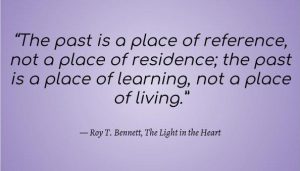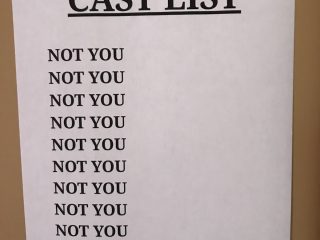It’s hardly worth mentioning that all paths of life carry tough choices. Some of us are lucky, and we get to choose, well, among “first world” problems. Hopefully most of us are fortunate. Let’s take a quick look at some of the challenges you are likely to face with a life in the theatre.
We’ll begin with this old chestnut—
When Should I Join the Union?
This is likely ground that has been previously covered by StageAgent but let me add my two cents. It’s all about the opportunity. If you plan to have any longevity in theatre (either as an actor, a stage manager, technician, musician) then the Unions are likely in your future. I’m not saying it’s impossible to make your living as a theatre artist outside of Actor’s Equity, SAG-AFTRA, AGVA/AGMA or Local One, but it’s fair to say that it’s unlikely. So, assuming membership is in your future, when should you take the plunge?
You must look at the opportunity in front of you. As an actor, you must ask yourself, “Can I compete in a more challenging market? Do I have enough credits? Do I know enough influential people or at least, up-and-comers?” If the answers to these questions are mostly positive, then look at the opportunity. If it’s a great regional theatre, or a great role in a medium-sized theatre, or a National Tour or obviously a Broadway show, then it is likely time to join the union. But if the opportunity is less than that (with all due respect to theatre companies of every size and shape), take a moment to consider your future. Is the offer in front of you low-paying, low-profile, short duration? Does this credit help you, or is it just a job? I know a handful of actors whose careers were hampered by joining the unions too soon, it’s rare to meet one who suffered from waiting too long. Generally speaking, what comes around once will come around again.
I Just Booked a Performing Job, But It Means I Have To Leave My Survival Job.
This one happens a lot. A survival job is necessary for 90% of people in the business (I made that number up. In truth, the real number is probably higher). But why did you move to New York City, or Los Angeles, or wherever you are chasing this dream? It wasn’t to wait tables, or temp, or sling drinks in a bar. It was to perform.
Large market cities like the ones mentioned above are expensive. Luckily, you can find many jobs that pay enough (not well, but enough) for you to pay rent, eat, audition, and maybe study. But these jobs, especially ones where you become comfortable, can become scarce. When I was a young(er) actor in New York, the very restaurant I worked in told me they didn’t like hiring actors because they knew they were bound to lose them. That’s a fair point, but I always felt there was something my managers were missing. ACTORS AREN’T ALWAYS FLAKES. In fact, the business is so hard, that many of us have excellent work ethics. And we needed the money we earned to support this passion, so we often work hard to ensure that money keeps coming in. Learn this mantra kids and repeat after Uncle Rob: How you do anything is how you do everything.
The money though, especially from serving/bartending, can be a trap. I would walk out of my restaurant some nights with two to three hundred dollars cash in my wallet. It was good money at the time (heck it wouldn’t be bad money now). I worked with A LOT of actors at that restaurant, the problem was, they never acted. They couldn’t jeopardize their seniority, their financial security, their social life the job provided them. They weren’t actors anymore, they were servers. Not all of them of course, but sadly, the majority.
Does Being a Performer Mean I Will Never Have a Family?
In short, no. It will be harder. The nature of building a career requires flexibility and independence. If I can be specific for a moment and get right to having children, obviously this impacts women more than men. They carry the child, their bodies undergo great changes, children typically require more of their mother than of the father (um…food). It’s unbalanced, and it may be unfair. I love my children more than I love myself and I know they love me, but the simple fact is, I’m not Mommy.
But of course, it is possible to have both. Practically speaking, I would wait until you have reached a level in the business you are comfortable with (whatever that is). But let me share the advice my first agent, the late Beverly Anderson, shared with me: “Don’t wait to have a life. Get married, have children. They make all your successes greater and all your failures less painful.”
Is It Time To Get Out?
Oof.
We’ve all been there. We’ve had droughts in auditions, employment, the skies look dark, we wonder if we’ve still got it. That’s just the nature of the business. t is a non-stop roller coaster of highs and lows, you feel on top of the world for a minute then you’re back to square one the next.
The truth here is, only you will know, and only you can decide. My advice is to simply listen to your gut. If it feels like it’s time, maybe it is. But if this is the path, no matter how much or how little success comes your way, then you must tough out the hard times. That’s true of any vocation. And walking away for a time doesn’t mean walking away forever. Maybe you’ll find it again. The late actor John Mahoney (“Frazier”) didn’t even try acting until he was 37 years old. One of the most beautiful things about theatre is, it never truly goes away.


















